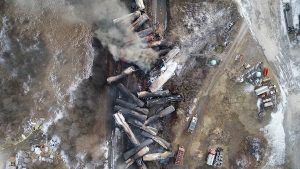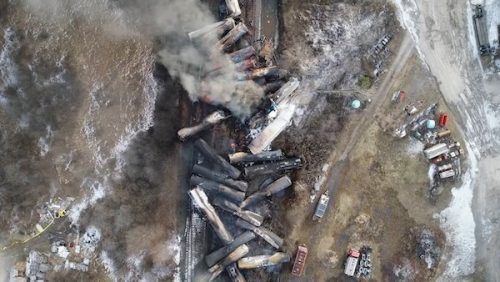By Dennis Sadowski | OSV News
(OSV News) — On the way to meetings of his Holy Cross congregation at the University of Notre Dame, Father Marc Fallon has noticed that while waiting at railroad crossings in northern Indiana the trains have gotten longer over the years.
While not necessarily counting the number of freight cars passing by, he estimates that the trains easily are more than 100 cars long, making the wait times longer.
Father Fallon, executive director of The Labor Guild in the Archdiocese of Boston, does not recall trains being so long in the past.
And he sometimes wonders about the freight being carried.
“It’s not like there’s neon lights telling you exactly what’s inside, nothing telling you what’s hazardous and not hazardous,” he told OSV News.
He points to the Feb. 3 fiery train derailment of a Norfolk Southern train in East Palestine, Ohio, where toxic chemicals spewed into the air and spilled into water sources, as an example of how communities along major railways can have their lives uprooted in a flash.
Catholics as well as people of faith generally, he said, are bound by their belief in serving the common good to advocate for improved transportation safety in order to protect families, workers, communities and the environment.
“(It’s) the whole idea of being vigilant. We need to stay in touch,” Father Fallon said.
The National Transportation Safety Board has opened a broad investigation into the cause of the East Palestine derailment, which led to the evacuation of some residents in the town of about 4,800 people near the Pennsylvania line.
While most people have returned home, many have reported feeling ill with headaches, stomach cramps, shortness of breath and nosebleeds.
Many residents are using bottled water saying they are not comfortable with state and federal tests showing water sources are safe.
Meanwhile, investigators are focusing on a faulty railcar axle as a possible cause of the accident. A security video taken by a camera at a company in Salem, Ohio, about 20 miles west of the derailment site, showed what appears to be sparks and flames under one of the railcars.
It remains uncertain whether the train crew was aware of the problem.
Leaders of labor unions representing railroad workers have expressed widespread concern that such disasters may ultimately result from recent changes in the way railroads operate.
Their uneasiness stems from a now widely used rail industry practice known as precision-scheduled railroading, which calls for running fewer but longer trains with a mix of freight. The practice, referred to as PSR, has led to smaller train crews, tighter schedules, speedier train inspections and fewer locomotives to deliver millions of tons of freight nationwide.
Industry executives have found that running longer trains lowers the frequency of train trips and reduces the number of locomotives and railcars needing maintenance. It also results in lower labor costs as the industry seeks to raise revenues while cutting expenses.
The U.S. Government Accountability Office studied PSR, which has been adopted by six of the country’s seven largest rail companies. In a December report, the agency said data on the effects of PSR on train safety were inconclusive.
However, the findings showed that at five of the companies overall employment has dropped by about 28% since 2011. Two companies showed steady or slightly increased employment.
Liesl Orenic, professor of history and labor history expert at Dominican University in River Forest, Illinois, suggested that workplace issues be discussed within parishes and religious congregations and to include the voices of workers in such conversations on protecting the common good in all settings.
While expressing concern that the widespread divisiveness in society can make such conversations difficult, Orenic said keeping the focus on the good of the community is required of people of faith.

“To me these concerns are universal,” she told OSV News. “There’s a Catholic perspective but there is common ground from people who are seeking to live in a world that is more beautiful, more bountiful for all.”
For Father Fallon and Father Clete Kiley, a Chicago archdiocesan priest who has been a longtime supporter of labor rights, lifting up the voices of workers in the rail industry and elsewhere is a moral imperative.
“And communities of faith, I think, really need to engage that,” Father Kiley said.
“It seems that our Catholic advocacy, our Catholic communities, we rank-and-file Catholics need to find a voice about the common good and about all of these different issues,” said the priest, who serves as chaplain of the Chicago Federation of Labor.
Advocacy for workers is a fairly recent addition to the Catholic social teaching tradition.
Pope Leo XIII, writing in his 1891 encyclical “Rerum Novarum” (“On Capital and Labor”) expressed broad support for the rights of workers to organize and join labor unions. Similar support for workers has been expressed by Pope Pius XI in “Quadragesimo Anno” on reconstruction of the social order in 1931; St. John XXIII in “Pacem in Terris” (“Peace on Earth”) in 1963; and by St. John Paul II in “Laborem Exercens” (“On Human Work”) in 1981 and “Sollicitudo rei Socialis” (“The Social Concern”) in 1987.
Pope Francis has made human dignity and the dignity of work a cornerstone of his papacy. He has repeatedly championed the rights of all workers to unionize. In one of his most recent audiences, he told the Italian General Confederation of Labor in December, “There is no union without workers, and there are no free workers without a union.”
Likewise, the U.S. Conference of Catholic Bishops has devoted a page of its website to “The Dignity of Work and the Rights of Workers.”
The bishops write, “The economy must serve people, not the other way around. Work is more than a way to make a living; it is a form of continuing participation in God’s creation. If the dignity of work is to be protected, then the basic rights of workers must be respected — the right to productive work, to decent and fair wages, to the organization and joining of unions, to private property, and to economic initiative.”
Such rich church teaching is appropriate for Catholics to adopt, said Clayton Sinyai, executive director of the Washington-based Catholic Labor Network.
“Catholic social teaching begins with the Gospels. It begins with the Scriptures more widely,” he said.
That teaching requires that worker voices regarding safe working conditions and risky industry practices outside of the workplace be heard, he added.
“The people who are most exposed to these threats are the people who work in the factory or who work in that environment,” Sinyai explained. “Unions play a very important role in not only protecting worker safety, but protecting the common good.”






















